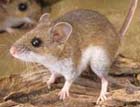Winners and losers in the countryside
The decline in countryside management has seen dormice benefit, but others are losing out, says Kate Green


Intensive management of the countryside has relaxed over the past decade, according to the Countryside Survey 2007 report published last week. This is to the benefit of wildlife such as dormice and hedgehogs, which gain more cover from predators, and red admiral and peacock butterflies, whose caterpillars feed on nettles. However, it’s not so good for small plants, such as wild strawberries and harebells, which are being swamped by ‘competitive’ brambles, nettles and hawthorn.
The number of plant species found on arable land has risen by 30%, showing farmers’ increased tolerance of weeds. Black bryony, wood avens and ivy have become more widespread; broad-leaved willow herb, oblong-leaved sundew and marsh foxtail are scarcer. The £10-million survey was commissioned by Defra. Survey author Dr Peter Carey says: ‘The end result for biodiversity is a complex pattern of winners and losers.
The countryside has got taller and a lot less managed. Plants described as thugs are taking over.’ About half of managed hedges were found to be in good condition, but just 8% of ponds were, with only about eight species per average pond, compared with 20 in the healthiest. Headwater streams had improved in quality, but the range of plants beside them has fallen by 8%.
Heaths and bogs are being dominated by competitive grasses, and heather has declined. There is a shift from coniferous woodland to broadleaved, mixed and yew, resulting in a decrease in species. Natural England has warned that the demise of the set-aside scheme could be a significant blow to the UK’s diversity.
Chairman Sir Martin Doughty says: ‘To secure the future of our wildlife, we need to think big rather than focusing on isolated pockets of concern.’ The NFU’s Paul Temple comments: ‘Farmers are demonstrating their commitment to the environment, with almost 63% of eligible agricultural land covered by a managed agri-environment agreement. Many are also undertaking voluntary action to address diffuse pollution to water.’
Exquisite houses, the beauty of Nature, and how to get the most from your life, straight to your inbox.
Country Life is unlike any other magazine: the only glossy weekly on the newsstand and the only magazine that has been guest-edited by His Majesty The King not once, but twice. It is a celebration of modern rural life and all its diverse joys and pleasures — that was first published in Queen Victoria's Diamond Jubilee year. Our eclectic mixture of witty and informative content — from the most up-to-date property news and commentary and a coveted glimpse inside some of the UK's best houses and gardens, to gardening, the arts and interior design, written by experts in their field — still cannot be found in print or online, anywhere else.
